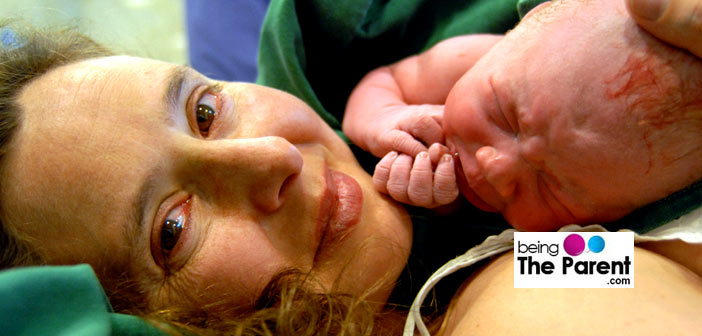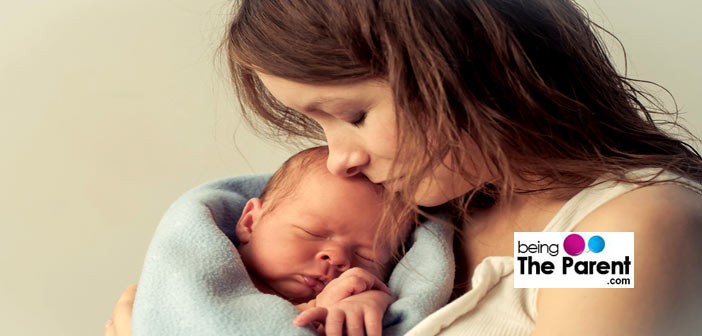Your recovery after childbirth during first few weeks totally depends upon your birth experience. The road to recovery is long if your baby was above 3.5kg and during pushing time your perineum was torn badly. Episiotomy can also make it longer for you to heal. But if in case your baby was smaller or it was your second or third baby and your perineum suffered less tearing or was intact then you can be one of those lucky women who can have a little quicker recovery than others.
Whether you had a vaginal delivery or had a C-section, being informed about the process of postpartum recovery will help you in coping up with tremendous changes your body will undergo through. So, here are a few changes which can occur during the first few weeks.

Vaginal Delivery: Changes And Complications
-
- Vaginal Soreness: There will be extensive vaginal soreness after delivery as your vagina was stretched to the maximum. If in case you had perineal tear or episiotomy during labor then you might feel pain, discomfort and swelling for few weeks. Here are some tips to recover and promote healing.
- Do not sit for longer period of time as it can delay the healing and will increase the pain and discomfort. Use sit-on-pillow or padded ring while sitting
- After urinating or a bowel movement clean it with plain water and remember to wipe it from front to back in order to prevent any infections
- Take some sitz bath or pour warm water on your perineum whenever you use bathroom especially after urination
- Take some pain relievers and antibiotics as recommended by your doctor
- If you have had an episiotomy, the stitches will dissolve themselves in a couple of weeks. To sooth the discomfort you can also use betadine solution
- Do not have sexual intercourse until you are healed properly
- Do remember healing is a slow process, so you can expect discomfort and slight pain for longer period of times and it’s better to go for weekly check-up during first three weeks after delivery. If in case you experience the constant swelling and increase in pain in vagina then contact your doctor immediately
- Lochia or vaginal discharge: You will experience a heavy vaginal discharge (lochia) for 4-6 weeks after delivery which usually consists of blood and dead tissues. The bleeding is maximum in first 2-3 days and then decreases over the next two weeks. It is bright red first and then become brown yellow, mostly this discharge will taper off after 5-6 weeks. Also there is a typical smell of lochia which is normal and should not be confused with the bad odor from lochia in postpartum infection. Below are few tips which you can use to cope up with heavy bleeding. You can read in detail about Lochia here
- Lochia does not need any specific management but there is an increased risk of spreading bacterial infection from vagina, so, use of tampons should be avoided and sanitary pads are the best options at this time
- Also you can use some disposable panties, so that you can use and throw them every time you change your sanitary pad
- Sex should also be avoided during this time
- Vaginal Soreness: There will be extensive vaginal soreness after delivery as your vagina was stretched to the maximum. If in case you had perineal tear or episiotomy during labor then you might feel pain, discomfort and swelling for few weeks. Here are some tips to recover and promote healing.
-
- Uterine Contractions: You can also feel some cramps or uterine contractions for first few days after childbirth as uterus goes back to its normal size and position. These contractions compress the blood vessels in the uterus which ultimately results in preventing heavy bleeding.
Generally you don’t need any treatment for these cramps as they often resemble mensuration cramps but still if you have heavy pain you can ask for some pain killers from your doctor - Hemorrhoids and difficulty in bowel movements: If there is any swelling or pain especially during bowel movements near anus then you might be suffering from hemorrhoids. Most of the time discomfort and pain intensifies so much that women find themselves avoiding the bowel movements especially as they fear hurting there episiotomy stitches.
- To lessen the pain and discomfort during bowel movements its important keep your stool soft and regular, so you must eat high fiber diet and drink plenty of water
- There are many stool softeners and laxative medication available in the market which you can ask your doctor to prescribe them for you
- Sore Breasts: After childbirth experiencing a sore, firm and leaking breasts is quite common in women and can be a cause of stress for them. Read more about breastfeeding pains and discomfort here.
- To ease discomfort or pain in case of firm breasts it’s better to gently message them with your hands and pour some warm water on them. You can also use breast pumps
- Before feeding your baby gently massage your breast every time for few weeks and always offer both breasts to your baby instead of only one
- If in case your breasts leaks too much milk then wear cushioned bra specifically designed for feeding purpose. They are quite convenient and cheap as well
- If in case you are not breast feeding your baby then don’t use any breast pump to express the milk and also you can use medications in order to stop your milk from coming
- Hair loss and stretch marks: While you were pregnant due to certain hormonal changes inside your body you must have experienced a decreased hair fall and lustrous hair but after child birth the situation is going to reverse. For first six months you can have more than usual hair fall which will generally declines after six months.
- Just keep your hair clean as after childbirth moms generally take some time in coping with new schedule of her baby and this makes it difficult for her to manage her hair properly.
- Stretch marks will also turn white or silver from bright red after some time but please remember they will not disappear but will only fade. Read more about making stretch marks go away here
- Postpartum Check-ups: Be regular with your all checkups after delivery as they are important to check the healing progress of vagina, cervix and uterus. If in case you have some doubts or questions you can also ask them from your doctor. It is a perfect time to talk about birth control and resuming sexual activities. So don’t hesitate and ask your doctor openly about it
- Uterine Contractions: You can also feel some cramps or uterine contractions for first few days after childbirth as uterus goes back to its normal size and position. These contractions compress the blood vessels in the uterus which ultimately results in preventing heavy bleeding.
After child birth it will take some time for things to feel totally “normal” again so don’t stress yourself and start taking things slowly. Your baby is born and it’s a time of joy and excitement so start look at your bundle of joy and feel happy about it.

